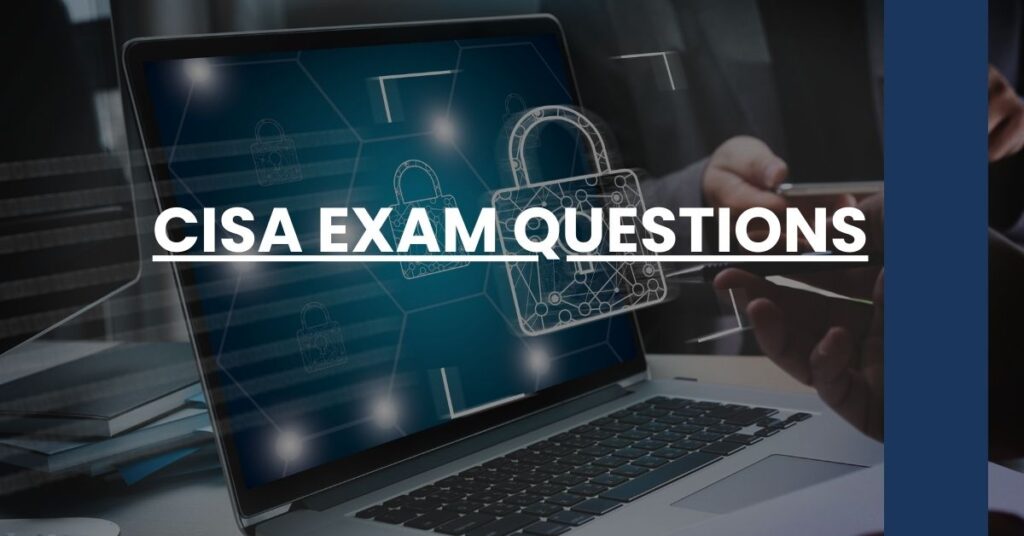Master your preparation with these essential CISA exam questions to ensure success.
- Practice Makes Perfect: Hone your skills with a variety of CISA exam questions tailored to the test’s format.
- Real-World Scenarios: Tackle questions that simulate real-life challenges an IS auditor may face.
- Expert Insights: Learn from detailed explanations provided for each practice question to deepen your understanding.
Get ready to conquer the CISA exam with confidence.
Understanding the CISA Certification
Embarking on the road to earning a Certified Information Systems Auditor (CISA) certification is a wise move for professionals in the field of information systems auditing, control, and security. This widely esteemed credential, managed by ISACA, serves as a benchmark of your capability and excellence in the sphere of IT governance and control. Here’s what you should know about the CISA certification:
- What It Signifies: Holding a CISA certification illustrates your proficient knowledge and skills in assessing an organization’s information systems and finding solutions to boost the company’s overall IT security.
- Who Should Consider It: If you’re working as an IT auditor, consultant, assurance professional, cybersecurity professional, or hold a similar role with an interest in information systems control, this is your calling card to an advanced career.
- Career Benefits: A CISA certification can unlock doors to career progression, boost your salary potential, and place you in high demand in a marketplace that is ever-appreciative of qualified information systems experts.
Why CISA Certification Holds Value
As you dedicate hours to preparing CISA exam questions, it’s essential to understand the inherent value of this certification. It’s not merely an accolade to hang on your wall but a career accelerator that is globally recognized. From heightened job opportunities in international markets to earning a seal of approval from peers and employers alike; the CISA designation isn’t just respected – it’s sought after.
The CISA’s Role in Today’s Tech Landscape
In today’s fast-paced tech landscape, threats to information systems evolve rapidly. Your CISA certification arms you with updated industry knowledge and practices, helping you anticipate and mitigate risks with finesse and strategic insight.
Exam Overview and Format
The CISA exam is structured to ensure you can apply critical thinking and professional judgment in real-world scenarios. Here’s a look at the layout:
- Question Format: You will tackle 150 multiple-choice questions that challenge you to demonstrate not just what you know, but how you would apply that knowledge effectively.
- Core Areas: The exam encompasses five domains, each instrumental to the practice of information systems auditing. Each domain carries a percentage that denotes its weight in the overall exam.
Time Allocation and Scoring
You will get 240 minutes (or four hours) to navigate the CISA exam’s questions, reflecting on both your speed and understanding. To pass, a minimum score of 450 out of 800 is required, signaling to employers your readiness to protect and manage their information systems.
Navigating the Five Domains
To give you a clearer understanding, the five domains range from Information System Auditing Processes to Protection of Information Assets. The comprehensive coverage ensures that you are prepared for a variety of challenges and opportunities in information systems auditing.
Core Areas of Study for the CISA Exam
Investing your time wisely in understanding the core areas of the CISA exam not only primes you for success on the test day but also enriches your professional expertise. Let’s delve into the major domains:
- Information System Auditing Process: This is the bedrock of your role as a CISA-certified professional, where you’ll need to prove your command over audit standards and risk management.
- Governance and Management of IT: Here, your knowledge of frameworks and practices that ensure IT’s alignment with business objectives is put to the test.
- Information Systems Acquisition, Development, and Implementation: In this domain, you must illustrate proficiency in ensuring that IT projects and investments deliver value and operate with minimal risk.
- Information Systems Operations and Business Resilience: Your ability to manage and secure day-to-day IT operations, along with planning for continuity, falls under this critical area.
- Protection of Information Assets: A CISA needs to be adept at safeguarding information assets. This domain assesses your competence in the implementation of information security controls.
Why Each Domain Matters
Every domain encapsulates a facet of information systems auditing and control that is invaluable to businesses. Whether it’s managing IT risks or ensuring streamlined operations, the domains collectively form a comprehensive checklist of what makes an excellent information systems auditor.
Types of Questions on the CISA Exam
As you confront the CISA exam questions head-on, expect a range of question types designed to measure your abilities to the fullest. Here’s what you’ll encounter:
- Scenario-Based Questions: Emphasizing practical application, these questions paint a picture of a situation you might face in the field and require a strategic, well-thought-out response.
- Knowledge-Based Questions: These query your understanding of the terms, concepts, and methods that form the building blocks of your profession.
- Case Studies: Some questions may present a condensed case study, challenging you to demonstrate depth in your analysis and decision-making skills.
Emphasis on Application and Analysis
Remember, CISA exam questions demand more than rote memorization; they assess how you apply concepts in various contexts, analyze scenarios, and make judgment calls. Every question is an opportunity to showcase your expertise and critical thinking capacity.
The Right Answers Matter
Getting the questions right involves more than identifying the correct option; it’s about knowing why an answer is appropriate. Your practice should hone your ability to discern the nuances in each question, paving the way for a deliberate and informed choice when you tackle the actual exam.
Sample CISA Exam Questions and Explanations
Crafting your approach to the CISA exam requires familiarity with the types of questions you’ll encounter. To aid your preparation, let’s walk through some sample CISA exam questions, accompanied by explanations that unravel the reasoning behind each answer. This method not only helps you understand the content but teaches you the analytical skills needed for questions you may face during the exam.
Understanding Sample Questions
As you study the sample questions, treat them as a window into the exam’s intricate world. Observing how questions are structured and the type of thinking they require will be instrumental in your exam success.
Example 1: Information System Auditing Process
Question: During an information systems audit, the auditor detects a variance between the system’s actual performance and the performance criteria established in the SLA (Service Level Agreement). What should be the auditor’s NEXT step?
Options:
- Document the variance as a finding in the audit report.
- Assess the impact of the variance on the business.
- Notify senior management immediately.
- Suggest a revision of the performance criteria.
Answer and Explanation: 2. Assess the impact of the variance on the business.
Explanation: ISACA’s standards emphasize the importance of business relevance. The primary concern for the auditor is how discrepancies affect the organization’s operations. Before jumping to report the issue or notifying senior management, the auditor must first gauge the impact to determine the severity and necessary disclosure.
Example 2: Governance and Management of IT
Question: What is the MOST effective way to ensure that an organization’s IT strategy aligns with its business objectives?
Options:
- Regularly test the IT systems for compliance with business requirements.
- Engage business stakeholders in the development of IT projects.
- Conduct annual reviews of the IT strategic plan.
- Compare the IT strategy to industry best practices.
Answer and Explanation: 2. Engage business stakeholders in the development of IT projects.
Explanation: Effective stakeholder engagement ensures that the business objectives are ingrained in the IT strategy from its inception. By involving key stakeholders in the development and execution of IT projects, alignment with business objectives is more likely to be achieved than through the other options, which are more reactive or periodic in nature.
Evaluating Your Answers
When you analyze these sample CISA exam questions, focus on how you arrived at the answer. Ensure your reasoning aligns with industry standards and practices. Mastering the ‘why’ behind each answer empowers you to tackle unfamiliar questions on the actual exam with confidence.
Preparation Tips for the CISA Exam
Success in the CISA exam isn’t solely about having the right answers to potential questions; it’s about crafting a study plan that prepares you to address these challenges and come out ahead. Here are some tips that can help streamline your efforts.
- Customize Your Study Schedule: Design a realistic study timetable that fits your personal and professional commitments, allowing for comprehensive coverage over time without burnout.
- Use Diverse Learning Resources: Complement official materials with diverse formats, like video tutorials and group study sessions, to reinforce your learning experience.
- Practice, Practice, Practice: Regularly attempt practice exams under timed conditions to acclimate yourself to the pace and pressure of the real CISA exam.
- Seek Feedback: Discuss difficult concepts with peers or mentors to gain different perspectives and clearer understanding.
Remember, as you employ these tactics, the goal is not just to pass the exam, but to deeply internalize the material, strengthening your professional foundation as a CISA.
Resources for CISA Exam Preparation
The internet is a treasure trove of resources for aspiring CISA professionals. To capitalize on this wealth of knowledge, be discerning and prioritize resources that align most closely with the CISA exam’s standards and your learning style.
- Official ISACA Study Material: Leverage ISACA’s comprehensive suite of preparation materials, including the CISA Review Manual and the CISA Review Questions, Answers & Explanations Manual.
- Online Forums and Study Groups: Engage with an active community where you can share insights, address concerns, and get support from fellow exam candidates.
By integrating these resources seamlessly into your study regime, you construct a well-rounded preparation strategy that leaves no stone unturned.
Conclusion: Next Steps After CISA Exam Preparation
Your journey through the complex landscape of CISA exam questions has equipped you with both the knowledge and analytical prowess to excel. Guided by this comprehensive understanding, embrace the challenges that await you in the exam with a strategic mindset. Your performance will be a manifestation of your diligence, thoughtful preparation, and unwavering dedication to advancing in the field of information systems auditing.
Bear in mind, the value of achieving the CISA certification extends beyond your test day triumph. It’s a progressive step that propels your career forward, enriching your entire professional trajectory. With your fortitude and aptitude, the next chapter after securing your CISA certification will doubtlessly be as rewarding as it is influential.

